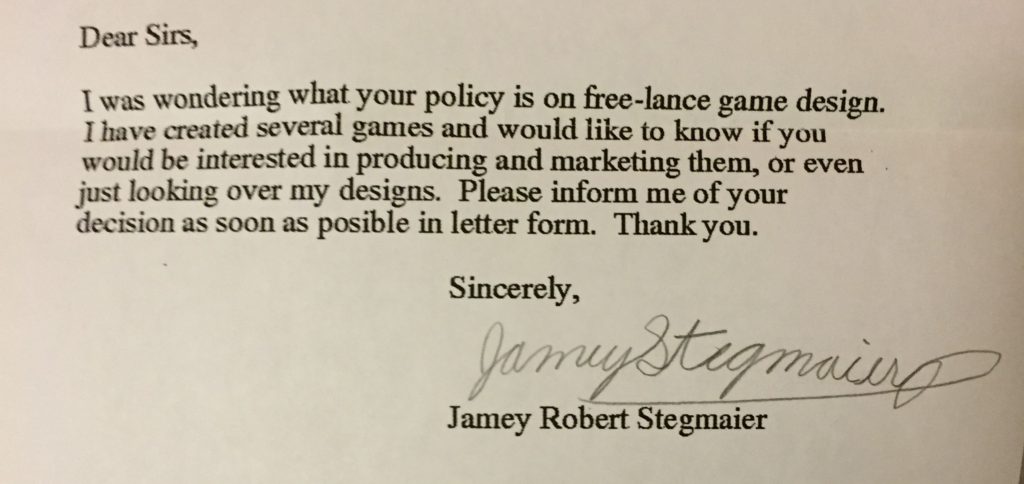When I was 14 years old, I had been designing board games for several years. I didn’t know much about how the game publishing industry worked, so I wrote the following letter to Parker Brothers, Hasbro, Avalon Hill, Wizards of the Coast, and Cadaco:

My parents recently found this letter and the responses while going through old boxes in their attic. This was way back in 1995. I’m sure it involved some level of encouragement from my parents, though I think it’s neat that my Young Jamey followed through on it.
That’s why I’m going to critique him, point by point. Perhaps this can help when you make first contact with publishers, bloggers, and other media creators.
- “Dear Sirs” Oo…this is a bad start. First, it’s kind of sexist. Second, it makes a huge difference to address someone by name. Third, it sets up the entire letter as a generic form letter. Never once does Young Jamey mention a specific game he enjoys from any of these companies–he just printed the same letter, signed it five times, and mailed it out.
- “I was wondering what your policy is on free-lance game design.” Okay, I’ll give Young Jamey a pass on this one, as the entire purpose of the letter is to learn information that wasn’t available elsewhere. In modern times, I would expect myself to first go on the publisher’s website to learn this info.
- “I have created several games” This is fine, but where’s the hook? Young Jamey should have mentioned what those games were, along with a one-line pitch for each.
- “[I] would like to know if you would be interested in producing and marketing them, or even just looking over my designs.” I think this might be the worst part of the letter. This is Young Jamey’s first contact with these companies, and he’s already asking them to do something for him instead of asking what he can do for them. It’s also disrespectful of their time to ask them to divert their attention from running successful game companies to look at his game designs.
- “Please inform me of your decision as soon as posible in letter form.” Other than the spelling error, the tone of this is just a bit too demanding for my liking. These people don’t owe him anything. Also, it’s more of an exploratory letter than a decisive one–what decision is he asking them to make?
Overall, even though Young Jamey doesn’t say it, the letter carries the tone of, “It can’t hurt to ask” and “You miss 100% of the shots you don’t take.” It can hurt to ask. You only get one chance to make a good first impression–do you really want to use that one chance to (a) ask someone to do something for you and (b) demonstrate that you don’t know how to look up basic information? If you are truly excited and passionate about something you’ve created, please don’t waste your first impression by looking for a shortcut. In other words, if you’re going to take a shot, at least first research the basic rules of what you’re shooting at.
What critiques would you add? Don’t go easy on Young Jamey–he should have known better. Plus, he’s stuck in 1995, so he can’t respond.
In the gallery below you’ll find the responses from each of these publishers. Even though they’re form letters, it’s awesome that they even took the time to respond.
Also read:
- Kickstarter Lesson #27: Bloggers, Podcasters, and Reviewers
- Kickstarter Lesson #74: Help Them First
- Kickstarter Lesson #150: The Power of a Personalized Message at First Contact
- First Contact with a Stranger in Your Industry
- How to Pitch (and Not Pitch) Your Game to Stonemaier Games
- Your Idea Is Brilliant, Your Idea Is Worthless
31 Comments on “Kickstarter Lesson #211: It Can Hurt to Ask (Sometimes)”
Leave a Comment
If you ask a question about a specific card or ability, please type the exact text in your comment to help facilitate a speedy and precise answer.
Your comment may take a few minutes to publish. Antagonistic, rude, or degrading comments will be removed. Thank you.










[…] your content, you’re using them. You’re treating them as a tool, not a person. And yes, it does hurt to ask. Instead of doing this, just create great content and occasionally tag people if you think […]
Man, Avon Hill really knocked you down with their response. It was a bit harsh, but they probably thought they were replying to a 20-something. I’m glad to see their responses didn’t stop you from creating!
Missing part of this sentence, or doggy habits? “In modern times, I would expect myself to first go on the publisher”
Thanks! I’ve fixed it. :)
I remember getting one of these from Nintendo around the same age. :D
That’s awesome, Brad!
Jamey,
Well, I’ll simply mention these two things…
First, good on you for having the gumption (since you’re in the Midwest, I wanted to use a regionally relevant word) to pursue your dream at a young age and by extension, I’m quite impressed by the responses you received…especially Avalon Hill!
Second, now more than ever I’m pleased with the crowd-funding sites which allow more and more games to see the light of day. While only a small percentage actually get made, it’s now in control of the end-users, not corporations to decide what hits our Gaming Tables!
Cheers,
Joe
[…] are not all born great, but some of us achieve greatness. Jamey Stegmaier unearthed a collection of old letters (yes, letters!) he sent to publishers years ago. Everyone has to start […]
I’m kind of surprised about the answers you got! I mean they took their time to write a long letter to you and give you some (maybe not that useful but still) advice. I hope that wasn’t “copy and paste” letter lol ;)
The title of your post and the conclusion of your post seems to be at odds with each other. In general, I find asking opens more doors than it closes. Obviously if you can do your research and due diligence, it can go a long way.
I’m attending PAX South as an exhibitor, but I’m just an indie game designer who does this on the side. Even so, I’m willing to spend some money on some prize giveaways for people who stop by my booth for a demo. However, I was given some great advice to ask companies for prize sponsorship. So I reached out to a few companies whose products are relevant to board games and that I genuinely use and love. So far I’ve had very positive responses.
Even with the case of 14 year old Jamey, the response from Avalon Hill is full of wonderful information. So I would say, yeah, it *can* hurt to ask, but not as much as *never* asking. There are a lot of fish in the sea, and if it means ruining your first impression with one publisher just to be more informed for the next, I think it’s still worth it.
You’re right! The point of the post is that it actually can hurt to ask. It was intended as the hook, but I can see how it might be confusing.
This reminds me of when I was 14/15 and I sent some emails to Avalon Hill, Fantasy Flight and Rio Grande Games. I had a few questions about the industry, which they politely answered and referred me to BGG. From there, I was exposed to a whole new world of games that I didn’t even think existed. I can definitely thank them for that.
I didn’t even think there was a time where Avalon Hill and BGG existed at the same time… Or e-mail and Avalon Hill for that matter.
And jeez, you are young then.
It was great reading those! Thanks for posting. Man, am I glad we have the Internet now!
I really like the Avalon Hill reply, and would love to see it posted where every designer will see it. Perhaps your blog will suffice for that ;)
I agree, it’s a fantastic letter. It respond to several of the things Young Jamey said so precisely that it almost appears to not be a form letter, but there are certain parts that don’t relate to what I said, making me think it must have been a generic (albeit detailed) response.
You’re welcome to share it (and/or this entry) as you wish.
That’s really interesting. I enjoyed reading the responses from these companies in 1995… and even know Don from his work running WBC. All similar, some helpful, some matter-of-fact in tone. I think it shows a somewhat fearful side to the industry roughly 20 years ago… maybe that’s still the case with larger companies, maybe not… but I’d like to think that publishers now- even if they don’t consider submissions- are generally more helpful and less afraid of legal action for receipt of something in the mail.
When I’m asked if I accept submissions, the answer is usually no simply because of the amount of work I’m already engaged in with games in development or production. But I always point designers to helpful resources and other publishers should they find luck with them.
I sent a 10-page (notebook, with chads still on) instruction booklet to Jaleco for my new roller derby game. It was inspirted by the late 80s “Rollergames” show that came on. It was even colored…in marker.
They sent me a great reply, and told me to keep making games. I have.
Dear Mr. Stegmaier….
Mike: That’s awesome! I like that you were willing to share the entire game with them, and that they actually replied. :)
This is hysterical, adorable, awesome, and totally lets your age out of the bag if you ever sought to hide it. : P
I divulged mine on Twitter last night (raving over Final Fantasy 15) so I guess it’s all good. : )
–
–
It’s also neat to “retrospective” on what boys do at 13-14 y/o and how it becomes a career path.
Any other gentleman here thinking “Yup, now that you mention it!” ??
Ha ha…I hide my birthday, but not my birth year (1981). :)
Did Young Jamey pay attention to the advice from Avalon Hill? (also, Hasbro spelled your name wrong. ha!)
I think Young Jamey read and treasured those letters…and then somehow forgot they existed. :)
Whoa, go Avalon Hill! That’s a truly amazing reply.
Indeed! Props to that VP!
So…follow up article from Jamey on how much he used the content of that missive? :)
Totally! The Avalon Hill reply is still quite relevant today.
Dave, I’m sure I read all of the letters, though I completely forgot they even existed. I think they did help me better understand how the game industry worked.
Am I the only one who feels that the Avalon Hill letter (or parts of it) should be sent to budding kickstarter developers now? I sometimes feel like Kickstarter has produced an outlet for very poor designs, just as Steam has produced an outlet for very poor games.
For every Stonemaier, there are a thousand… umm… I couldn’t guess…
If the kind of service for helping to self publishing a game is still available that could probably be a great idea for first time game makers to make sure they are able to get things delivered on budget and on time, and they can probably learn stuff during the process to be able to take on more of the responsibility in future efforts.
Absolutely. Actually it should be required reading for any game designer who has ambitions to get published in any form. What a great and helpful response.
I see Hasbro mispelled your name. :)
It’s okay–it happens. :)